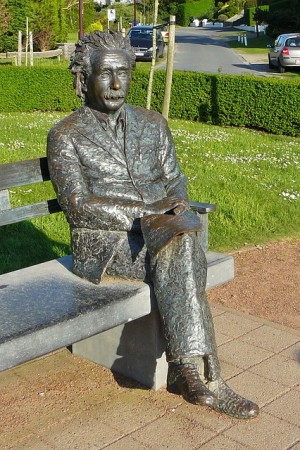brilliant, highly-gifted ![]()
[adverb/adjective]
[ge-ni-aal]
 “Geniaal” is linked to “genius” (“genie” in Dutch) and has always been used in the sense of “highly-gifted” people. A synonym of “geniaal” is “hoogbegaafd” (literally: “highgifted”). You can also use the word to describe ingenious ideas, events, people, jokes, food, places etc..
“Geniaal” is linked to “genius” (“genie” in Dutch) and has always been used in the sense of “highly-gifted” people. A synonym of “geniaal” is “hoogbegaafd” (literally: “highgifted”). You can also use the word to describe ingenious ideas, events, people, jokes, food, places etc..
Examples:
– “De nieuwe show van die cabaretier is geniaal, je moet hem zien!”
(“The new show by that cabaret performer is brilliant, you have to see it!”)
– “Mensen met een IQ van boven de 148 worden beschouwd als geniaal.”
(“People with an IQ of over 148 are considered to be highly-gifted.” Note that in this sentence, you can replace “geniaal” by “hoogbegaafd”.)
– “Heb je de laatste tijd nog iets leuks gelezen?” “-Ja, ‘Saturday’ van Ian McEwan, echt een geniaal boek!”
(-“Have you read anything fun lately?” “-Yes, ‘Saturday’ by Ian McEwan, a truly brilliant book!”)
– “Clifton is een geniaal strand in Kaapstad.”
(“Clifton is a fantastic beach in Cape Town.”)
– “De Graaf van Monte Christo bedacht een geniaal ontsnappingsplan.”
(“The Count of Monte Christo came up with a brilliant plan of escape.”)
Related words:
– Hoogbegaafd: highly gifted [adjective, adverb].
– Genie: genius [noun] [het genie, de genieën].
Example:
– “Vind je Bill Gates een genie van onze tijd?”
(“Do you think Bill Gates is a genius of our time?”)
– Briljant: 1. brilliant [adverb/adjective]; 2. diamond [noun] [de briljant, de briljanten].
Extra:
Note that the plural of “genie” gets an extra “e” in the plural “de genieën”. This is due to the fact that the emphasis of the singular “genie” is on the last syllable. The same goes for instance for “idee” (“idea”) which becomes “ideeën” but not for “kolonie” (“colony”) where emphasis is not put on the last syllable but on the middle one: “ko-lo-nie”. Therefore, the plural of “kolonie” is “koloniën”.
